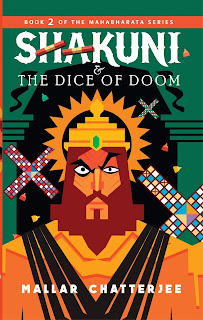SHAKUNI & THE DICE OF DOOM by Mallar Chatterjee
Book
2 of the Mahabharata Series
Shakuni has always been an unforgettable figure in the
Mahabharata, the base villain portrayed as shrewd and unscrupulous with a
problematic leg. This stereotype was further reinforced by the effective
performance of Gufi Paintal in BR Chopra’s Mahabharat, in which the ace actor
milked the role for all he was worth.
Mallar Chatterjee, in his latest book titled ‘Shakuni’, the
second book of the Mahabharata series published by Readomania, goes beyond this
charismatic character to provide answers that have not been touched on in the
above television show or in most books that have been written on the subject.
Where did Shakuni come from and why was he so filled with
venom and a need for vengeance? “I shall destroy the entire clan you are so
proud of and make you watch the ruin.” Why does this thought come to him and
who is he addressing?
The book begins on a thrilling note with anonymous
characters and a mention made of a special gift that was never delivered, which
gains significance at the end of the book.
It is noteworthy to see how, in those times, humiliations
were levied with such ease, provoking embers of rage that went on to create
immense feelings of revenge. Egos were huge, people were larger than life,
especially amongst the clans like the Vrishnis, the Yadavas, the Kurus and the
Gandharas.
An old prophecy plays a significant role, one that will
herald strained relationships leading to a tragedy of epic proportions
abounding in an atmosphere vitiated by jealousy, malice, hatred and unbridled
corruption. Royal marriages are political alliances of convenience, aimed at
annexing other kingdoms and amassing power. Thus, women like Gandhari and Kunti
play their parts in enhancing the strength and prestige of their husbands.
Many questions crop up. Why was Gandhari in love with
darkness? Who was Kunti before she became Kunti? More importantly, why did Shakuni
refuse the throne of Gandhara? The courtiers had decided to confer the title of
‘Gandhara Ratna’ on him, feeling that “A Gandhara without Shakuni was much like
a night without the moon.” Besides, he obviously loved his kingdom and he knew
that “this beautiful kingdom and the unsuspecting people loved him so much.”
What makes this book intriguing is the new angle that the
author gives into the thoughts of the main characters like Devavrata Bheeshma,
a man troubled by various undercurrents within his mind, thoughts that were
probably not explored by Vyasa when he wrote his epic. Vidur, the wisest of
them all, also reveals certain frailties that he did not act upon, but which lay
dormant in his mind.
This book becomes Shakuni’s own as the readers are
introduced to his wife, Arshi, a woman of acute insight, and his young son,
Uluk, who misses having his father around. Nowhere in the original epic does
anyone even muse on Shakuni’s family members, surprising actually when you consider
what a significant role he plays in bringing about the ruin of the Kauravas.
Yet another question that comes across in this book is this.
“Who is the real
nemesis of Hastinapura?”
The past, the present and the future come together, held
in place by a riddle that is thrown at Shakuni, one that holds the key to a
tenuous future. Shakuni strides like a colossus across the book, as colourful
epithets are used to describe him. He is a fox, a sadist, the mastermind with
unmatched brain power, as cruel and unforgiving as a serpent. He insinuates
himself in the affairs of Hastinapura, creating a niche for himself among the
Kauravas.
What is fascinating is the way Mallar Chaterjee has allowed
the character of Shakuni to develop, from a callow youth to a protagonist with
incurable wounds in his mind. He evolves from a petty conspirator to a man on a
serious mission, his mind ravaged by a new set of evil ideas.
“Well before the children of Dhritarashtra and Pandu came
into being, Shakuni had started casting them as important characters in a
gripping play that he was going to script and direct.”
If there is any moment where the readers feel sympathy
for Shakuni at any stage, it is quickly wiped out by what he himself terms as
his last strike, which “would inflict on his enemies a wound more grievous than
what his notorious dice had done.”
So, there you have it, the saga of a man who feels
himself wronged and sets out to avenge his wrongs. This is a book that stays in
your mind much after you have read it, maybe because the author starts from a
story oft told and meanders into regions never trodden upon before.





Comments
Post a Comment